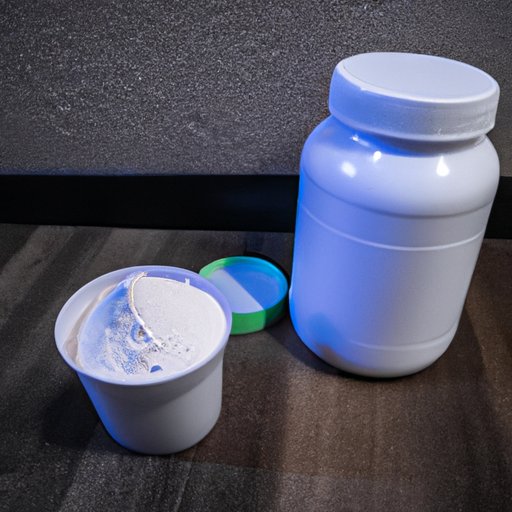
Introduction
If you’re into strength training or bodybuilding, you’ve probably heard of creatine. It’s a popular supplement that’s often touted as a game-changer for muscle strength and growth. But what exactly is creatine, and does it really make you stronger?
In this article, we will explore the science behind creatine and its impact on strength training. We’ll discuss how it works in the body, the research and studies that support its effectiveness, and the myths and misconceptions surrounding this supplement. We’ll also provide tips on using creatine supplements safely and effectively.

The Science Behind Creatine and Its Impact on Strength
Before we dive into the effectiveness of creatine for strength training, let’s first define what it is and how it works in the body.
Creatine is a naturally occurring compound found in the body, primarily in muscle tissue. It is made up of three amino acids: arginine, glycine, and methionine. Creatine plays a key role in energy production by helping to regenerate adenosine triphosphate (ATP), a molecule that provides energy to our cells.
During intense exercise, our bodies use ATP to fuel the contractions of our muscles. As our ATP levels deplete, our muscles tire and fatigue sets in. Creatine supplementation can increase the amount of creatine in our muscles, which in turn allows our bodies to produce more ATP.
Numerous studies have shown that creatine supplementation can significantly increase muscle strength, power, and endurance, particularly during short-term, high-intensity exercise.
For example, a study published in the Journal of Strength and Conditioning Research found that resistance-trained men who supplemented with creatine for four weeks had significantly greater increases in muscle strength than those who didn’t take creatine. Another study published in the International Journal of Sports Medicine found that creatine supplementation improved muscular power and work capacity during repeated high-intensity exercise.
Maximizing Your Workouts: How Creatine Can Boost Your Strength Training
So, how exactly can creatine improve your workout performance and help you get stronger?
For one, studies have shown that creatine can increase the amount of weight you can lift and the number of reps you can perform. This is likely due to the fact that creatine supplementation allows for greater ATP production and energy availability during exercise.
There are several different forms of creatine supplements available, including creatine monohydrate, creatine ethyl ester, and creatine hydrochloride. While creatine monohydrate is the most commonly used and researched form, some individuals may find other forms more effective for their body. It may take some trial and error to find the best form for you.
To maximize the benefits of creatine supplementation, it is recommended to take it in a loading phase (around 20-25 grams per day for 5-7 days) followed by a maintenance phase (2-5 grams per day). It’s also important to stay hydrated while taking creatine, as it can cause water retention and dehydration if not taken with enough fluids.
Debunking the Myths: Separating Fact from Fiction on Creatine and Strength
Like any popular supplement, creatine has its fair share of myths and misconceptions. Here are a few of the most common ones, along with the truth behind them:
– Myth: Creatine is a steroid.
– Reality: Creatine is not a steroid. It is a naturally occurring compound found in foods like meat and fish, and is also produced by the body.
– Myth: Creatine is only for bodybuilders.
– Reality: While creatine is often associated with bodybuilding, it can be beneficial for anyone involved in strength training or high-intensity exercise.
– Myth: Creatine is dangerous and has harmful side effects.
– Reality: Creatine is generally considered safe when taken as directed. However, some individuals may experience side effects such as stomach cramps or diarrhea.
The Pros and Cons of Creatine in Building Strength
Before deciding whether to supplement with creatine, it’s important to weigh the potential benefits and risks. Here are some pros and cons to consider:
Pros:
– Increased muscle strength and power
– Improved energy availability during exercise
– Potentially greater gains in muscle mass
Cons:
– Water retention and bloating
– Possible gastrointestinal side effects
– Creatine may not be effective for everyone
It’s important to note that creatine supplementation is not a magic pill for muscle growth and strength. It should be used in conjunction with proper nutrition and a solid workout plan.
Creatine: A Safe and Effective Supplement for Increasing Muscle Strength
Despite the potential risks and misconceptions about creatine, it remains a popular supplement for building muscle strength and power. Studies have shown that it can be effective when used properly and can offer numerous benefits for those engaged in strength training.
When used as directed, creatine is generally considered safe. However, it’s important to talk to your doctor before starting any supplement regimen, especially if you have pre-existing medical conditions or are taking medication.
To use creatine safely and effectively, be sure to follow the recommended dosage guidelines, stay hydrated while taking it, and monitor any potential side effects.
The Real Story Behind Creatine and Its Ability to Make You Stronger
In conclusion, creatine is a supplement that can be highly effective for increasing muscle strength and power. Its ability to increase energy availability during exercise can lead to greater gains in strength and performance.
While there are potential risks and misconceptions surrounding creatine use, it is generally considered safe when used as directed. When used in conjunction with proper nutrition and a solid workout plan, creatine can be a valuable tool in your strength training arsenal.
It’s important to make informed decisions about your supplement use and to always prioritize your overall health and safety.
Understanding Creatine and Its Impact on Strength Training: What You Need to Know
In summary, here are the key takeaways from this article:
– Creatine is a naturally occurring compound that can increase energy availability during exercise.
– Creatine supplementation can lead to greater gains in muscle strength, power, and endurance.
– There are several forms of creatine supplements available, with creatine monohydrate being the most commonly used and researched.
– When used as directed, creatine is generally considered safe, but it’s important to talk to your doctor before starting any supplement regimen.
– Proper dosage and hydration are key to using creatine supplements safely and effectively.
– Creatine should be used in conjunction with proper nutrition and a solid workout plan.
By understanding the science and facts behind creatine supplementation, you can make informed decisions about your supplement use and maximize your results in strength training and muscle growth.





